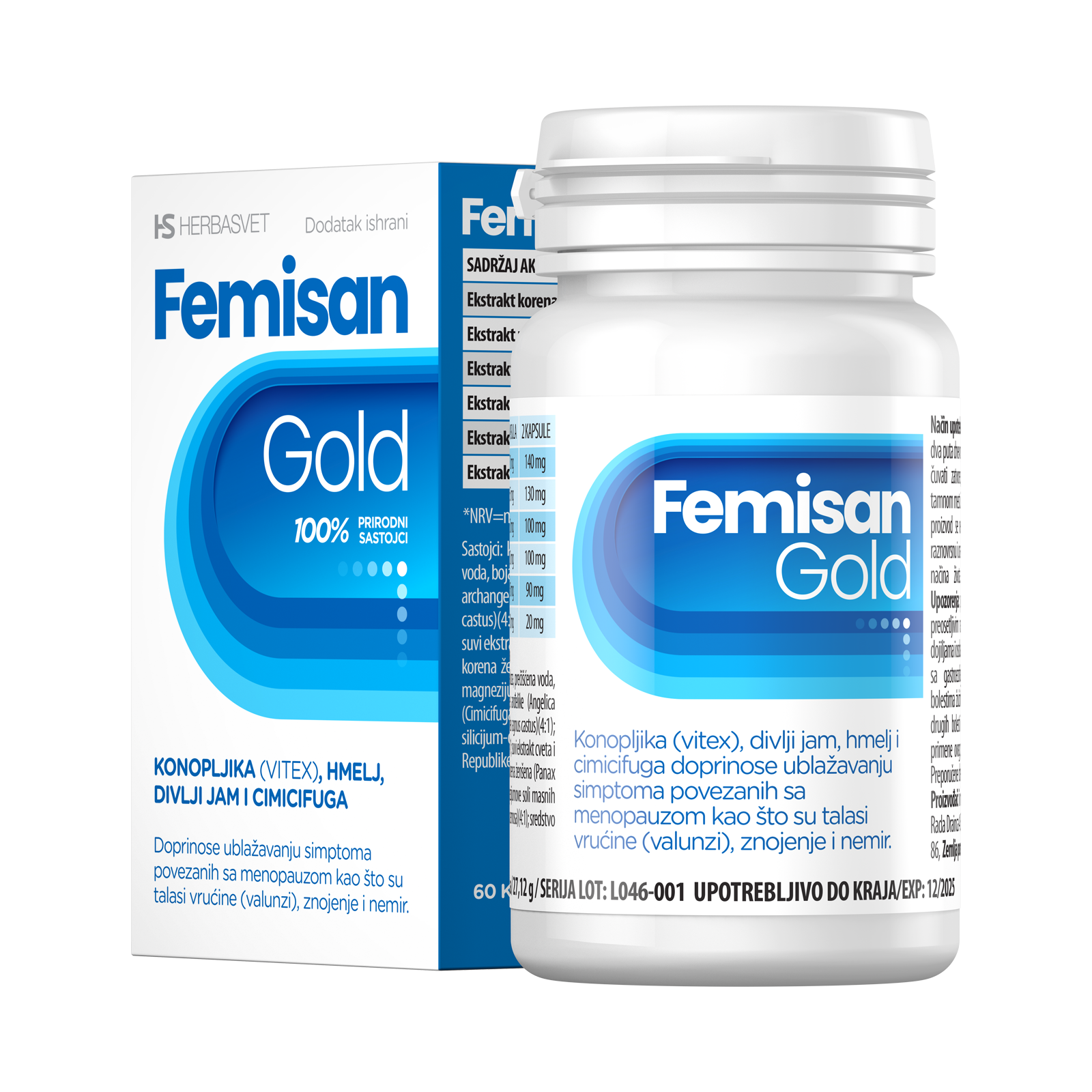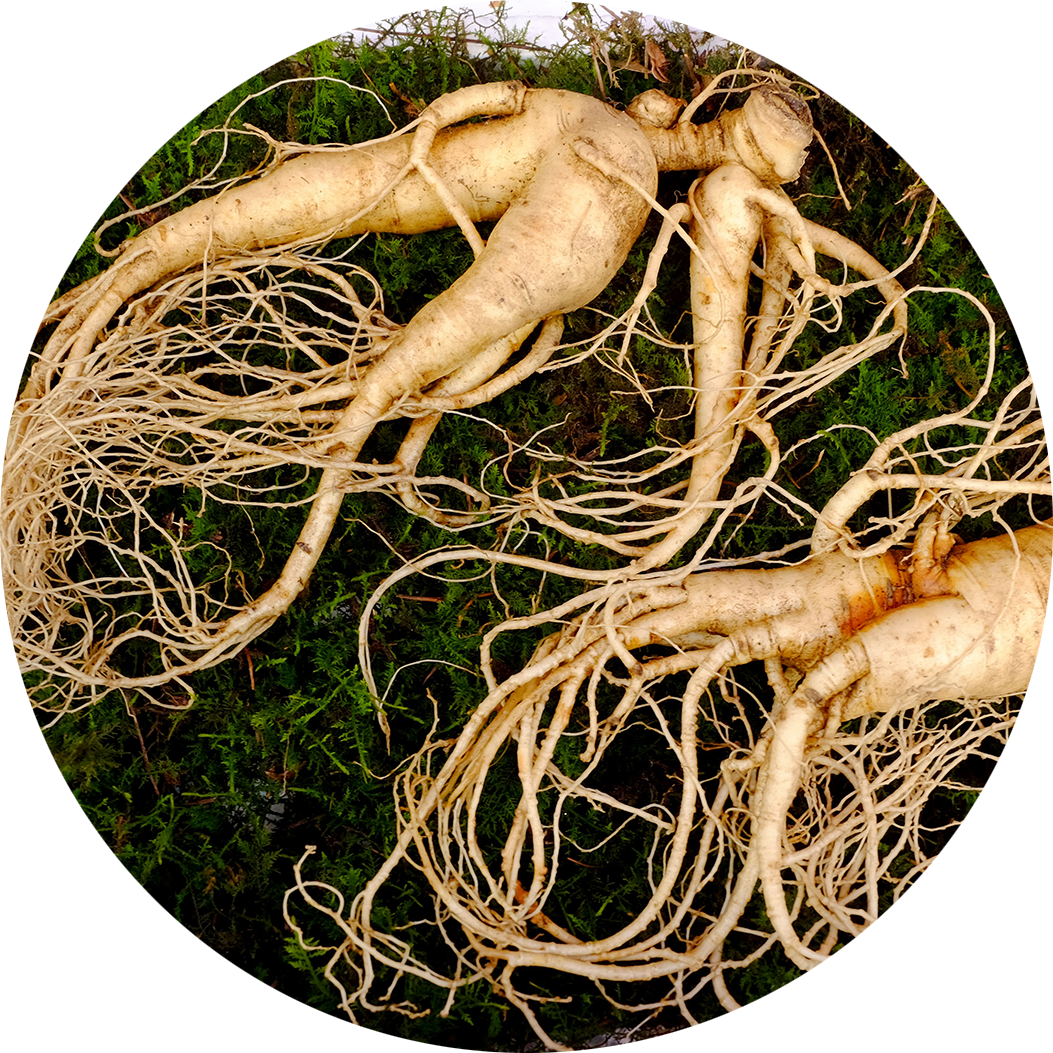(Panax ginseng)
The first thought that comes to most people’s mind when they think of traditional Eastern medicine is certainly ginseng. Panax ginseng, ginseng or Asian ginseng is a famous adaptogen, a plant that helps us fight the negative consequences of stress. It is also known as the “root of life”, not only because it has a positive effect on a number of disorders, but it also gives us energy and improves our mental functions, so we have the feeling that it brings us back to life. This plant with unusual roots originates from Manchuria (northeast China) and Korea and is an inseparable part of not only medicine but also of the philosophy and religion of their peoples. Ginseng directly affects Qi, the vital force, the life-giving energy that flows along the meridians. When Qi is low, when its movement is blocked, weak or uneven, disease occurs. And it is precisely ginseng that has the power to restore Qi and allow it to flow freely through all meridians.
The name ginseng originates from the Chinese renshen, a compound meaning “man” and “root”, a human-shaped root, alluding to the unusual forked shape of its root that really resembles a human figure. And this is one of the reasons, in addition to its power that borders on magic, that it has become part of numerous ancient and modern fairy tales, novels and films. Its scientific name, Panax ginseng, indicates power: panax comes from the ancient Greek panacea, meaning “cure for everything”. Is this true and how does ginseng bring us back to life?
GINSENOSIDES AND GINTONIN
Today we know that the magic that surrounds this plant is not accidental. Clinical research has established that ginseng’s power comes from its main component, ginsenosides, which have a number of beneficial effects, including anti-inflammatory, antioxidant and anti-cancer. Ginsenosides are saponins, triterpene glycosides that are a common ingredient in plants, they stimulate their growth and increase resistance to external influences. More than 150 ginsenosides have been identified in ginseng so far, of which the most abundant are ginsenoside-Rb1, -Ro, -Rg1, -Rc and -Re. Ginsenosides have been proven to have a positive effect on the central nervous, cardiovascular and endocrine systems. They directly affect the reduction of total cholesterol and triglyceride levels, act as vasodilators, which is why they have strong cardio-protective action. Although it was thought that they have a phytoestrogen effect by directly binding to oestrogen receptors, new research has disproved this, which puts this plant high on the list of strong fighters against breast cancer.
Another component that has only recently been discovered in ginseng is the glycolipoprotein gintonin. Studies initiated in order to establish what substance can have positive effects on cells, in addition to ginsenosides (whose share in the total saponins of the plant is 50 percent), identified gintonin. Gintonin is a glycosylated protein complex containing lysophosphatidic acid (LPA), which is an intercellular lipid mitogenic mediator. Gintonin activates G protein receptors (GPCR) for LPA, protecting metabolism and thus preventing a number of disorders, from inflammation, through neuropathic pain, cardiovascular diseases to cancer.
Today’s science symbolically calls ginsenoside and gintonin the yin and yang of ginseng pharmacology.
WHAT ARE GINSENG’S EFFECTS?
This powerful adaptogen helps us cope with stress and challenges that modern life exposes us to on a daily basis. What the Chinese knew 2,000 years ago has been confirmed by modern science: the active components of this plant have a strong antioxidant effect, they slow down ageing, eliminate fatigue, revitalise the body and act as a vasodilator; they also have antiatherosclerotic, antihypertensive, antiinflammatory, antiallergenic, immunomodulatory, anticancer and antidiabetic action. Their activities also have a neurological effect – so ginseng has proven to be an effective antidepressant, anti-epileptic and antipsychotic.
Everyone can benefit from this magical human-shaped root, but there is a group that is particularly vulnerable in one phase of life and to whom this plant can provide great help: women on the verge of menopause. Although menopause is a natural process that inevitably awaits every woman on average around the age of 51, its symptoms are not at all pleasant, and at the same time, due to the loss of the protective effect of hormones, it also brings with it a number of general health risks. After entering menopause, the risk of developing cardiovascular diseases, diabetes and osteoporosis increases, and just entering the transition period is accompanied by numerous symptoms that can last up to 10 years. Mental fog, forgetfulness and memory difficulties are common symptoms of menopause that cause confusion and concern. Also, women who develop hypertension during this period are more susceptible to cognitive disorders later in life. Ginsenosides and gintonin from ginseng have shown great potential in the treatment of cognitive deficits, including the most severe, Alzheimer’s disease.
GINSENG, SALVATION IN MENOPAUSE
Ginseng does not only eliminate the symptoms of menopause, but it has been proven significantly to reduce cardiovascular risk factors. Ginsenosides inhibit the production of free oxygen radicals (ROS), stimulate the production of nitric oxide, which is a natural vasodilator, improve blood circulation and improve vasomotor tone and lipid profile.
Another insidious disorder that affects women after menopause is osteoporosis: up to four per cent of bone mass is lost each year at the beginning of the transition period. Especially prone to osteoporosis are women who enter menopause too early, which is an increasingly common case today due to heavy pollution, exposure to chemicals that negatively affect the work of hormones and stress. The good news is that ginseng has a proven positive effect on bone metabolism: in a 12 week-study involving ginseng supplementation in women suffering from osteopenia, a significant improvement in the main indices of bone building was observed.
A common symptom of menopause is a feeling of intense and prolonged fatigue. A study has found that, after only eight weeks of taking ginseng, menopausal women do not only lose the feeling of fatigue, but also the signs of biological ageing are reduced, thanks to the ability of this plant to act directly on mitochondrial functions. Studies have proven its positive effect against chronic fatigue in both sexes.
This herb is also traditionally used to improve sexual energy and numerous studies have proven that it has a positive effect on the problem that women often face at the onset of menopause – low libido, i.e. a lack of sexual desire. As for men, it is also useful to treat erectile dysfunction: according to one study, ginseng is much more effective in treating this disorder than standard therapy.
The already mentioned antioxidant and anti-inflammatory effect of ginsenoside is extremely useful for women who have achey joints, which is a common symptom of menopause, because oestrogen regulates inflammatory processes to a large extent, and with its decline this effect also decreases. As it is also responsible for the balance of fluids in the body, swelling is common during menopause.
And, finally, ginseng improves immunity, it can help us avoid the seasonal flu, and has a proven anti-cancer effect, causing apoptosis of cancer cells and inhibiting their angiogenesis. Numerous studies have shown that this plant significantly reduces the risk of cancer, specifically cancer of the lips, mouth, throat, oesophagus, stomach, colon, liver, pancreas, ovaries and lungs, and that it also reduces the risks that cigarette smoking and alcohol consumption carry.
Ginseng can be safely used in prescribed doses for up to six months without a break, and since the level of ginsenosides and gintonin depends very much on the way that the plant is processed, it is important to procure it from reliable sources. It is the top quality ginseng that is an ingredient in a new product from the Herba Svet laboratory: Femisan Gold capsules. Along with chaste tree, wild yam, hops, black cohosh and angelica, ginseng helps us maintain a good hormonal balance and the protective effect of hormones for as long as possible. When the time comes for menopause, we can enter it easily and painlessly, without experiencing unpleasant symptoms so that we can spend our golden age carefree and in excellent health.

